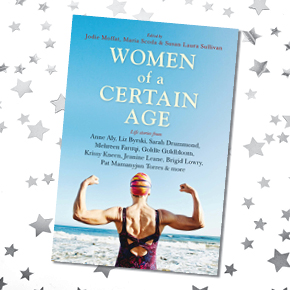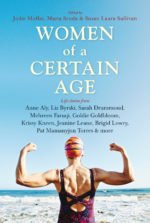Read this and be smarter: what does it feel like to be a woman ‘on the other side of 40’?

Women of a Certain Age recounts the stories of 15 women who have struggled with identity and survival, all on their journey to becoming more certain of who they are and where they want to be. Below is an extract from ‘Everyday Sadness’ by international acclaimed author Liz Byrski, who knows exactly what it’s like to be a woman of a certain age.
‘I was in my mid-fifties when I began to think seriously about ageing – about becoming an old woman and what that might mean. I did so with a kind of relish, for I had never feared growing old. Confident, intelligent and energetic old people were part of my childhood; I envied their independence and freedom and wanted to be like them. Childhood was all about doing what one was told; old people did what they wanted when they wanted, even if someone had already cautioned them against it. It was the late 1950s, I was just into my teens, and the older women I knew had just enough money to eat in restaurants, take the ferry for holidays in France or Spain, and go regularly to the best hairdresser in the nearest small town – some even drove their own cars. As an only child, inclined to introversion and protective of my own space as well as my dreams, old age shone like a beacon in the distant future.
But even as I grew older it simply never occurred to me to think about how it might actually feel to be an old woman; how emotionally textured, how sometimes ragged with grief and stitched through with loss or regret, how physically and mentally challenging, it could be. I was going to have a happy old age, and as the years passed I remained convinced of this.
When was it that the current inane cult of happiness began? Whose idea was it that we should expect to be happy all the time, and that to be sad was some sort of failure of will or personality? Sadness is so much more interesting, rich and lasting than this infernal happiness. Indeed, it is sadness or nostalgia rather than happiness that that moves us when we respond to the world’s greatest works of literature, art and music – and sadness that has been their progenitor. We have come to despise sadness, to regard it as burdensome, negative, even as a sign of failure, and so we deprive ourselves of its value.
Now, in my seventies, I am living the good old age in which I so long believed, but in many ways it is not quite as I imagined it. Alongside all the benefits that I yearned for in youth, come the realities hidden for so long in my blind spot. In the course of an adult life we all experience grief, disappointment and loss. And I have kicked many own goals on the scoreboard of regret: broken relationships and friendships, roads not taken, opportunities missed, selfishness, cowardice, greed and neglect. But it was the reality of my parents’ ageing that helped me to understand the importance and the value of both grief and regret.
My father was in his early eighties, becoming very forgetful and sometimes confused, when a minor stroke catapulted him further along the road to dementia and a diagnosis of Alzheimer’s disease. My mother, who had always depended on him for everything, was confused and frightened by this, and resentful that he was no longer able to look after her. The familial triangle rocked in chaos. The old structure, at times suffocating and restrictive, at others liberating and supportive, shifted on what felt like a daily basis, as we grasped for the past and found it slipping from our hands.
I became my parents’ carer shortly after my sons had left home. I had a demanding job, a busy social life, and was free of other responsibilities, so I bitterly resented this new one. My parents had always tried to do their best for me, so resenting having to take responsibility for them is not something I’m proud of; it reveals a dark and selfish aspect of my nature which I’d prefer to hide. But I know I’m not alone in this experience and perhaps if we can speak more freely about our reactions, which feel so shameful, it might be easier to manage them. Alongside the resentment, I struggled with the long slow grief of watching Mum and Dad become people I barely knew. And as they disappeared before my eyes I hated myself for my selfishness. I always knew that my parents loved me, but in my twenties I had begun to understand that they only tolerated each other. Our apparently perfect middle-class family life, serene on the surface, was laced with unspoken resentment and tension. Like so many only children I believed that it was up to me to fix this, that if I was exceptionally good and did well at school, the centre would hold, things would not fall apart.
Things didn’t fall apart, but reflecting on it now I realise I never really knew or understood either of my parents. So much went unspoken, so much was hidden, that in the final years of both their lives I felt that not only had I never really got to know them, but as an adult I had not allowed them to know me.’
Women of a Certain Age is available in all good bookstores and online.



